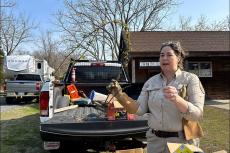After having been excluded from all four phases of the state's economic reopening plan, East End gyms and fitness centers finally began welcoming clients back on Monday with a slew of new safety protocols in place.
Recreational facilities had been on track to open in early July, according to the state's initial game plan for emerging from the economic shutdown, but in late June, Gov. Andrew M. Cuomo decided to keep them closed due to concerns that the facilities' air-conditioning could spread the virus.
Bruce Cotter, the managing director of the company that owns the Sag Harbor, East Hampton, and Southampton Gyms, was perplexed by the delay. "We're not in phase four, and there's no phase five," he said at the time.
There was no further guidance from the state until Aug. 17, when the governor announced that gyms and fitness centers could reopen as long as they implemented a long list of "rigorous safety protocols."
They will have to operate at 33 percent of capacity, ensure that clients wear face coverings at all times and maintain six feet of social distance, have heating, ventilation, and air-conditioning systems with upgraded air filtration, and undergo a Health Department inspection, among other requirements.
Last Thursday, Suffolk County held a virtual meeting for gym owners to discuss the guidelines.
Katherine Mitchell, who along with her son Brook Hartnett, a personal trainer and a Navy veteran, owns the new Allegiance Personal Training gym on Springs Fireplace-Road in East Hampton, attended that meeting. Since opening in June, the gym has been holding sessions online and outdoors, but the duo has been eager to utilize the indoor space.
At the meeting, Ms. Mitchell said she was asked to file an affirmation that the business would comply with the state's mandates, and was told that the Health Department would conduct an inspection within the next two weeks.
Prior to opening on Monday, she had stocked up on Centers for Disease Control-approved sanitizing solutions, and had the gym's HVAC system outfitted with a new filter. "It was a simple fix and not expensive," she said.
The gym provides personal training to groups of four or five, so it will not be impacted by the requirement to limit capacity, said Ms. Mitchell. "Our model is the perfect model for the post-Covid world."
As for the requirement to have customers wear masks, even in the midst of a demanding workout, she said, "We don't have an opinion on it, we're just doing it. Our goal is to open once and stay open."
Ms. Mitchell credited Charlie Cassara, the owner of SC Fitness gyms in Farmingdale and Hicksville, for helping her open safely. Earlier this summer, Mr. Cassara founded the New York Fitness Coalition, a nonprofit that advocates for 1,000 gym owners. On July 8, he filed a class-action lawsuit on behalf of the coalition's members whose livelihoods were being imperiled by the state's refusal to let them open. "We're happy that everybody can open now," said Mr. Cassara, but it was "inexcusable" that owners were kept waiting for so long.
The coalition's lawsuit and a proposal it had shared with the state suggesting gyms undergo health inspections had "forced the governor's hand" and accelerated the reopening, he said. Small gyms, however, will likely still suffer economic losses because of the 33 percent-capacity requirement, Mr. Cassara said. "We operate on low margins, unless the capacity numbers continue to go up we're not going to make it and our landlords aren't going to make it."
Mike Bahel, the owner of the Body Tech gyms in Amagansett and Montauk, said he is not fazed by the need to reduce capacity. The Amagansett space has room for 52 people on the main floor, and 46 on the lower level, but "we've never had even close to a third of that," he said. The mask requirement, however, may be daunting for some. "If you're on a treadmill for a 30-minute run, that's pretty rough," he said. "But everyone who's into health and fitness is going to be smart and safe."
Barry's Bootcamp studios in Southampton and Wainscott opened earlier this week after spending weeks developing a set of protocols. "We put together an advisory council of health care experts to help inform how and when we reopen," said Jessica Vikser, a spokesperson for the company. The studios now have hospital-grade filters in their HVAC systems, plus air purifiers and ultraviolet-light sanitizing units.
Customers will not be allowed to share equipment, she said, and the studios will schedule extra time between classes for a thorough cleaning of the spaces.
Shortly after being forced to shut down, the company had launched Barry's at Home, which offered virtual classes. Now, said Ms. Vikser, "People are yearning for connection and they are eager for a sense of normalcy, so we are seeing a demand for in-person classes." But for those who might still be wary about returning to fitness centers, Barry's at Home will still be an option. "We want to make sure we're serving our clients no matter what," she said.




